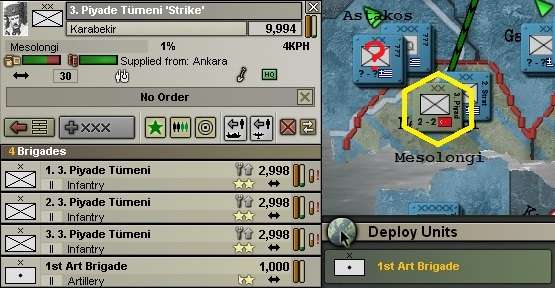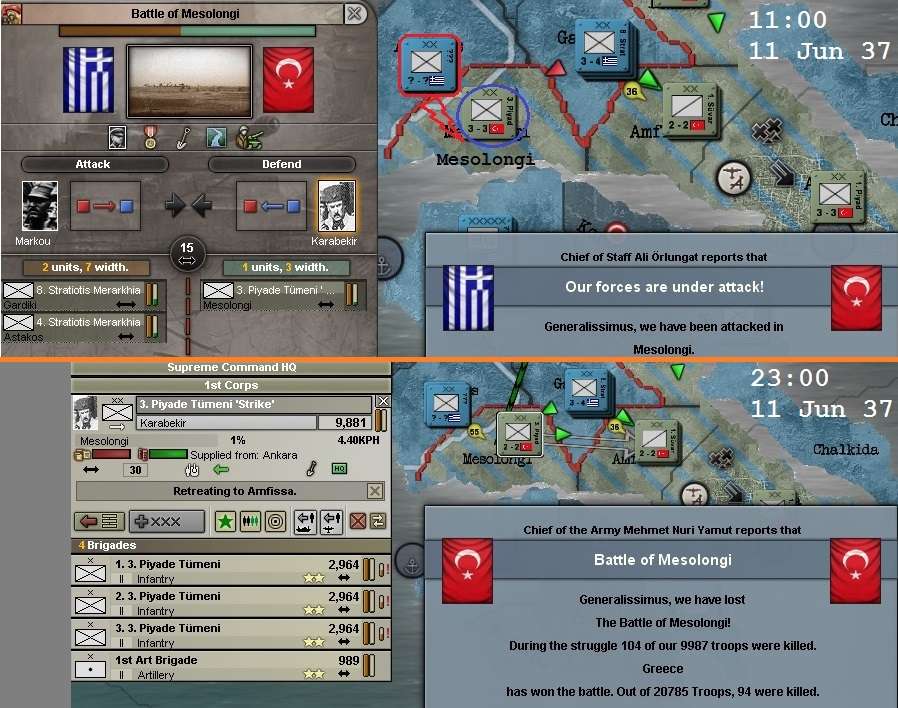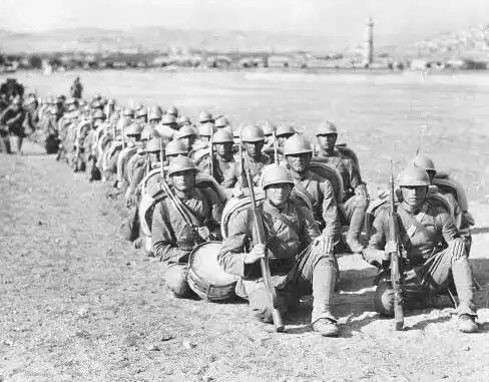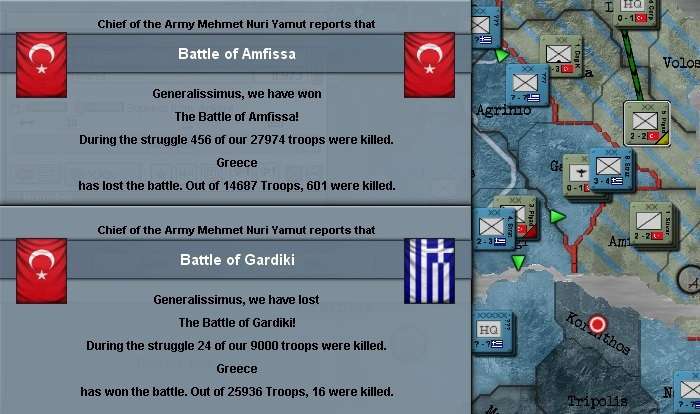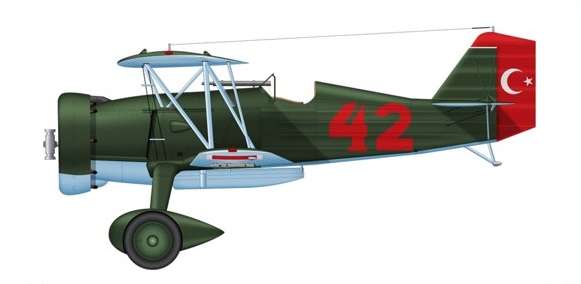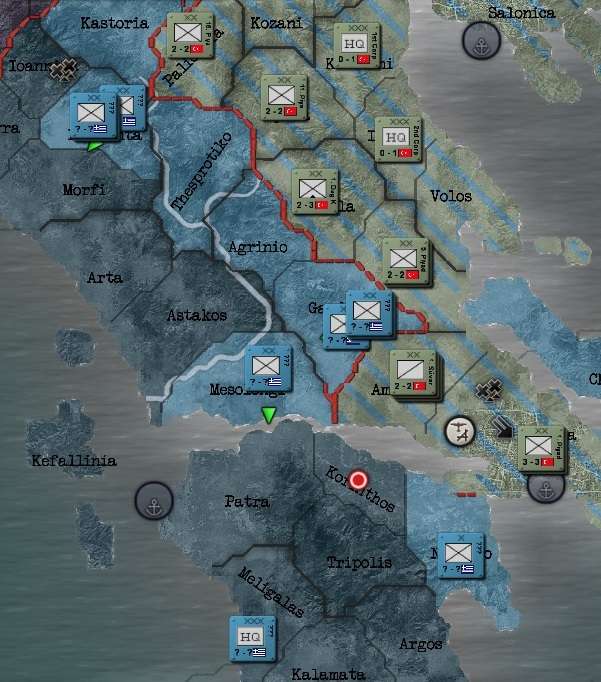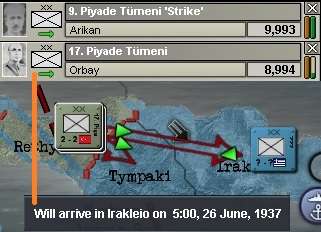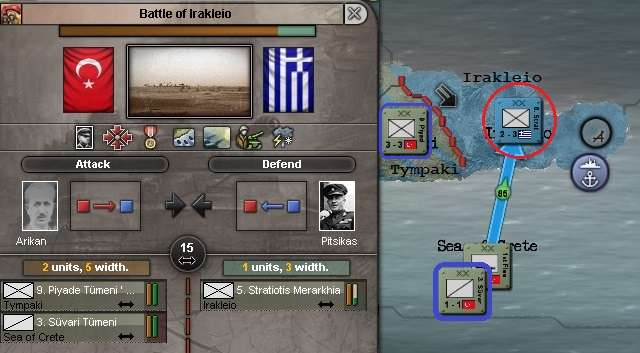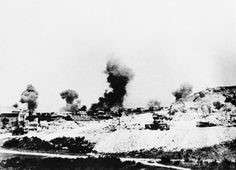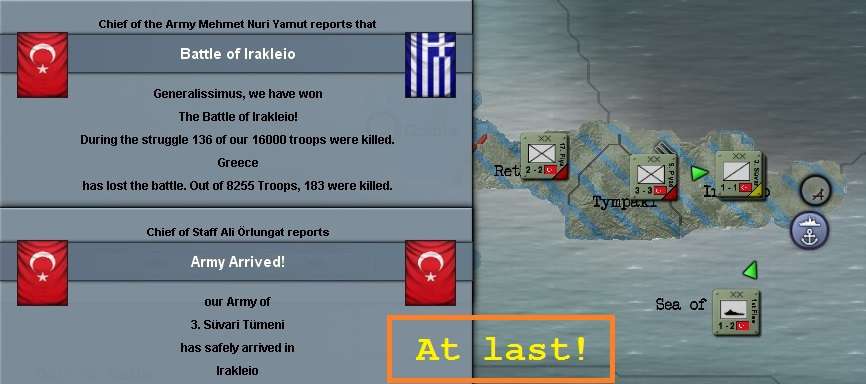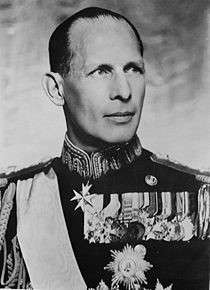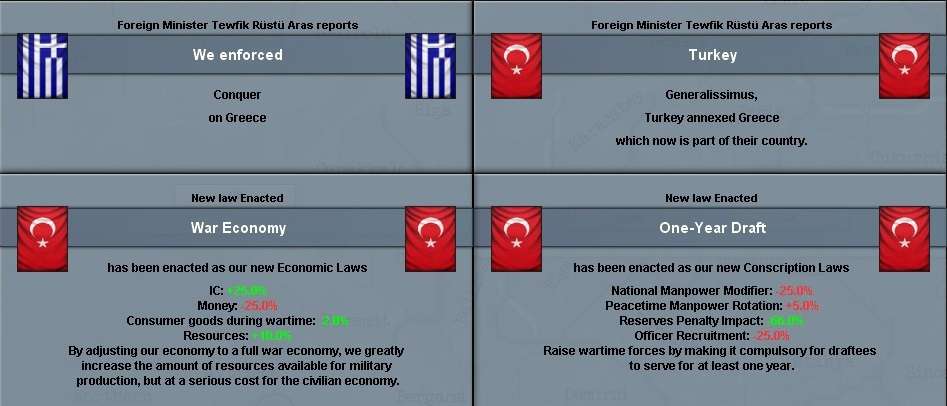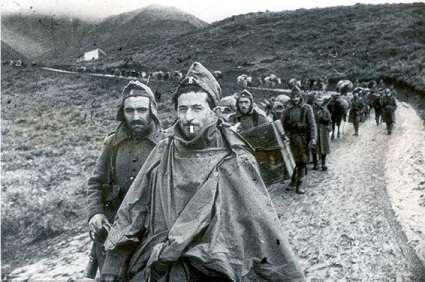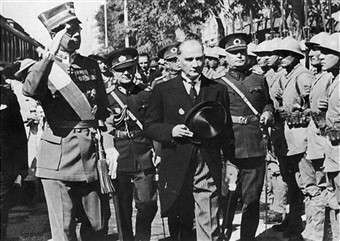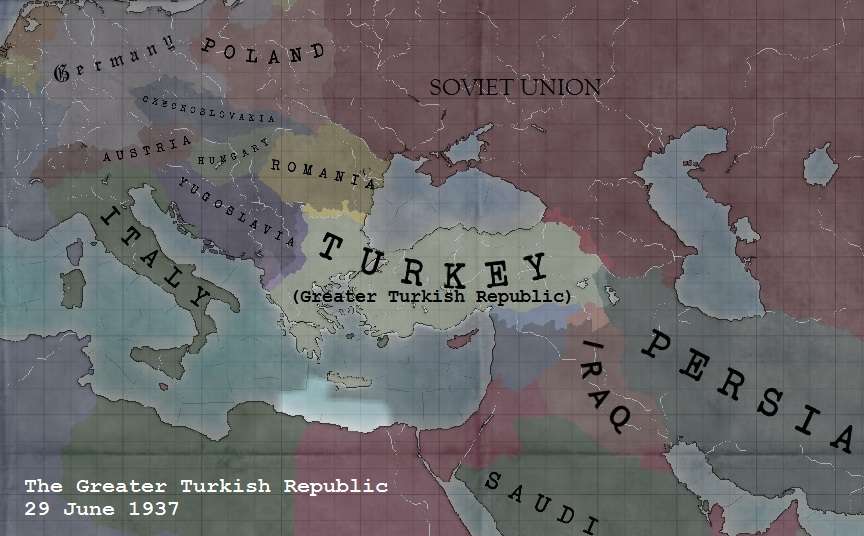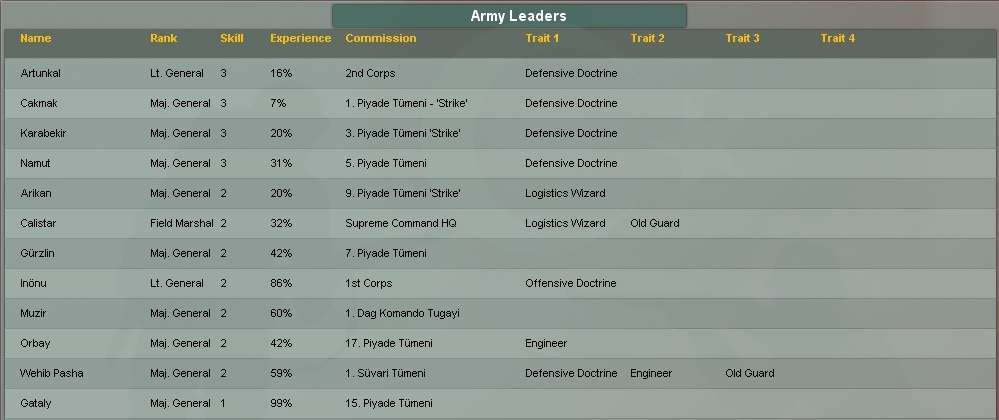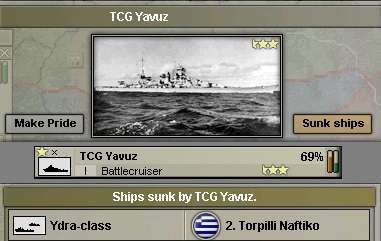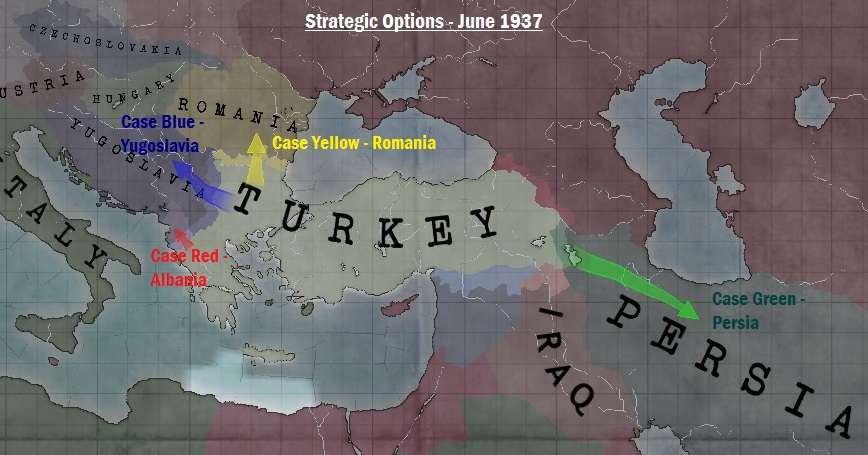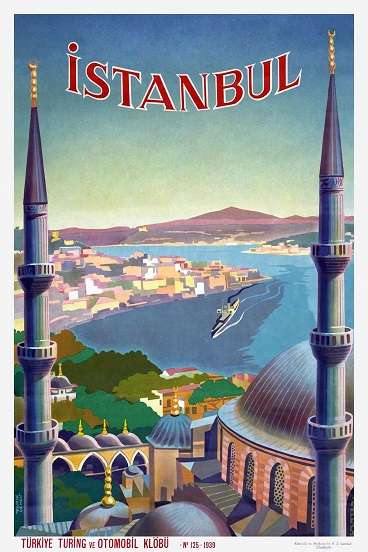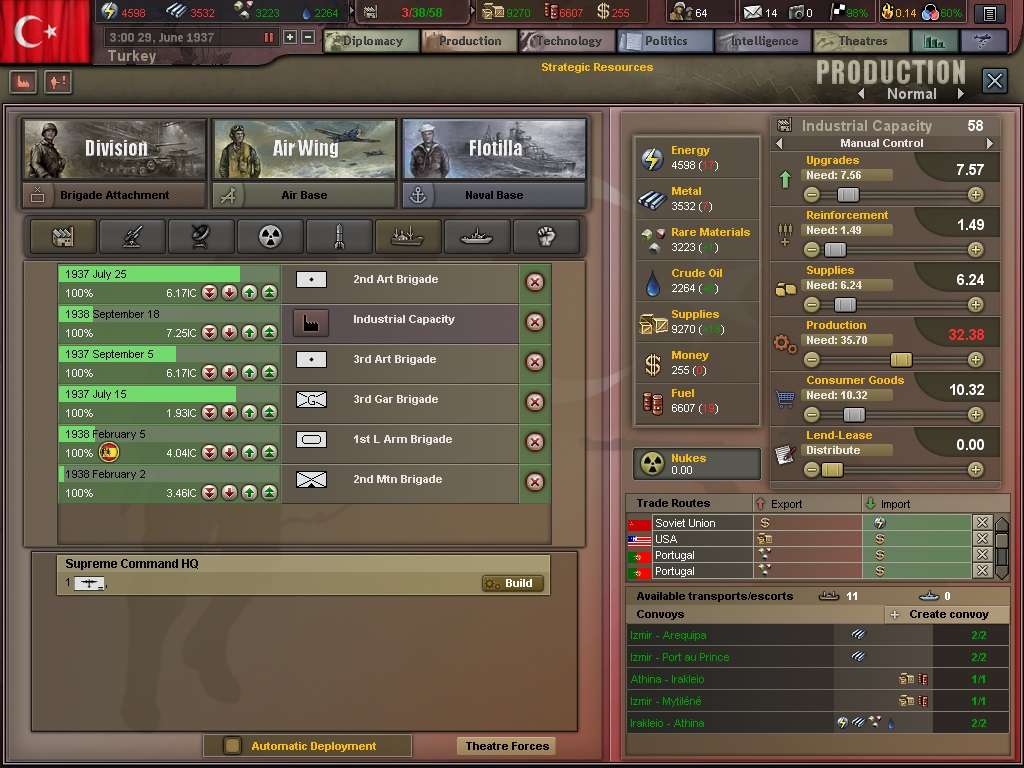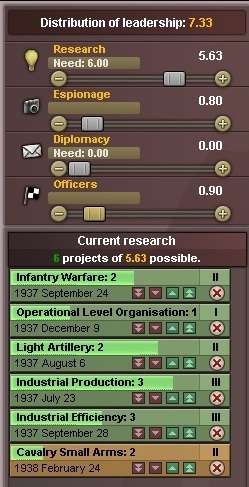Chapter 22: War with Greece #9 – “Antici…….pation!” (6 to 29 June 1937)
I have split this report into parts, to take events in three main areas of operations by turn, partly to be able to compress a lot of action – and waiting – into a single update. When things get more complicated and larger in scale later in the game, such discipline will have to be applied to get through the game in a reasonable period. But while the wars are small, intense and
mano-e-mano, I thought it nice to concentrate on them in some detail, explaining many of my tactical, operational and strategic choices (and before I’d seen what the results would be, so I can match my expectations against the outcomes).
The events, although they overlap in time, are in broad sequence and each sticks to the internal chronological order I’ve been using for the wartime 'battle diaries'.
Part One – Mesolongi
8 Jun 37 (D+44)
0200. Our previous update finished on the evening of 6 June, with the last of the four victories in five hours that “shook the Greeks”. Karabekir’s men have had
some time to dig in and recuperate over a day and a bit, but not much. Organisation remains dangerously low. Earlier reports had suggested the Greeks may be in the process of a general withdrawal to the north-west across the front, towards the port of
Kerkyra, where we assume they are getting supplies shipped from the new capital of Corinth. Surely the Greeks know by now they are beaten and resistance is futile? Apparently not! The Greek 4th Div under Markou launches a surprise night attack, during a storm! After just three hours, the Greek attack looks to be well contained and failing. By 0800 it is over, with no losses to the gallant 3 Inf Div (apart from yet another night’s sleep ruined by an inconsiderate enemy). A fifth victory in
Mesolongi, hopefully the last.
9 Jun 37 (D+45)
0500. Our third new artillery brigade is produced. In recognition of their recent efforts and being at the end of a long line of defence in mainland Greece, it is delivered directly to 3 Inf Div in
Mesolongi. It will take a while to come up to organisational strength, but hopefully it will help them hold. Later that morning, word reaches Karabekir that reports of a full Greek withdrawal were clearly dead wrong. They have attacked
Amfissa to the east in significant strength, which risks the 3rd being cut off. But for now, Karabekir stays put, hoping
Amfissa holds strong (a Greek attack there had been anticipated some days back, and reinforcements are
en route there from further north). But, as he surveys the enemy front at first light, he looks at the latest aerial recon report and asks his intel officer “What are those
other two Greek infantry divisions doing lurking over the river in
Astakos?” “I don’t know sir”, comes the reply. “Well find out then!” barks Karabekir, who is famed for only liking surprises he springs on others.
11 Jun 37 (D+47)
1100. Two days later, the answer is clear: they were working up enough courage to attack! The Greek 4th and 8th Divs combine this time. The Turkish 3rd defends all day, but their organisation is too low, there is heavy fighting in
Amfissa to their east and the war will be won elsewhere (on Crete, where things seem to be going well and an early victory is on the cards). Why continue to fight and die for this mangy patch of Greek soil, which will be ruled by Turkey soon enough anyway? Karabekir orders the withdrawal to
Amfissa while they still have the option to do so voluntarily, to preserve lives and ensure they are not trapped and cut off should things go badly in
Amfissa.
2300. 3 Inf Div successfully breaks contact in the middle of the night. Sixth time unlucky in
Mesolongi, but their job is done. We just need to hold
Amfissa and
Athina until
Irakleio can be taken to end the war.
Part Two – The Battle for Amfissa
9 Jun 37 (D+45)
1000. The full-strength Greek 13th Div in
Gardiki attacks Wehib Pasha’s 1 Cav Div, which is currently holding
Amfissa to preserve the supply lines west to
Mesolongi where the 3 Inf Div gallantly holds out, and to
Athina, to the south-east. They have had three days now to dig in, which should help their defence. 3 Cav Div was ordered south from
Trikala after the victory in
Lamia three days ago, to cover just such an eventuality, but are still some way off.
1300. The Greek 7th Div (also full-strength) joins the attack, remaining in reserve for now. This brings the odds up to
43%: still in our favour, but getting more serious, especially if the Greek 7th Div reinforces before our own relief columns arrive. HQ 2nd Corps seeks urgent advice from 3 Cav Div’s acting commander: “When can you get to Amfissa?” The reply: “By about 1900 tomorrow”. It will have to do.
10 Jun 37 (D+46)
2000. 3 Cav Div arrive, pretty much on time. The Greek 7th hasn’t reinforced yet and the arrival of 3 Cav improves the odds a little (to
35% in our favour). 1 Cav Div are holding on well. The fighting continues.
11 Jun 37 (D+47)
0900. The Greek 7th Div finally reinforces in the combat. While this doesn’t change the odds much (now
37%), it is dangerous, as the attrition on 1 Cav Div will now increase and 3 Cav remain in reserve.
12 Jun 37 (D+48)
0700. 1 Cav Div continues to fight on alone. They are starting to lose organisation, but Wehib Pasha uses a detachment of cavalry and armoured cars to flank the assault and negate the Greek’s attacking bonuses. Huzzah! By now, they have received word that the 3rd is withdrawing from
Mesolongi – it is vital
Amfissa is held until they can pass back through our lines to safety. The redoubtable 7 Inf Div have recovered enough from their defence of
Lamia to be sent as further reinforcements to
Amfissa, just in case things get worse. They will arrive tomorrow evening.
13 Jun 37 (D+49)
1900. 7 Inf Div arrives on time. They too go into reserve, bringing the odds down to
26%. But 1 Cav Div still fights on alone and is losing more organisation. Although the Greek 13th Div looks close to breaking, the 7th remains strong. Things are back to the old “attack vs defend” attrition on the front line.
14 Jun 37 (D+50)
1200. The fighting drags on. Casualties mount. The Greek 13th Div has broken for
Gardiki, but their 7th is fresh, and
neither of our reserve divisions has been able to reinforce. Another problem with our doctrine we are far off from fixing. 1 Cav Div is getting seriously pounded: despite the odds being
26% still, it could easily go wrong if we can’t reinforce. 3 Inf Div is still on the road back from
Mesolongi, desperately hoping their comrades can hold their lifeline open. Air recon of
Gardiki shows the Greeks are taking heavy casualties themselves, but they still fight on. As the situation deteriorates, Namut’s now fully reorganised 5 Inf Div is ordered to put in a spoiling attack on
Gardiki from
Lamia: Inönü hopes this will disrupt the Greek attack, given the inability of our reserve units in
Amfissa to reinforce.
Troops of the Turkish 5 Inf Div prepare for their flanking assault on Gardiki, 14 Jun 37. This
proved to be the turning point of the battle and for land operations on the Greek mainland.
1800. This last tactic seems to have worked! The Greek 7th Div breaks off the attack and retreats back to
Gardiki. The spoiling attack by 5 Inf Div is immediately called off. Casualties for the main battle of
Amfissa were heavy, with 1 Cav Div bearing the brunt, but they are the proud victors of
Amfissa after five days of heavy fighting. Another battle honour for Wehib Pasha and the troops of the 1st Cavalry. 3 Inf Div will be safe!
Hitay’s Curtiss Hawk III interceptors have been providing ground support harrying the attackers, but are now very low on organisation and are recalled to
Athina to recover. The tac bombers, although a little better off from their previous rest, are also recalled, as they will be needed in Crete, where supply problems and difficult terrain have delayed the hoped-for
coup de grace.
The Curtiss Hawk III – the mainstay of Turkey’s only interceptor wing. It will have to do: in Bulgaria
and Greece it has faced no opposition, so has been used for recon and light ground support.
19 Jun 37 (D+55)
0700. The victory in
Amfissa seems to have spelled the end of major land operations on the Greek mainland. The general situation is summarised below. 3 Inf Div recuperates in Athens – Cakmak shares the Ouzo with Karabekir (whose skill level has now progressed to 3).
Part Three – Crete: Operation Minotaur
6 Jun 37 (D+42)
1900. You may recall that the last update finished with Inönü weighing up the decision whether to immediately counter-attack the Greeks in
Irakleio (the last Greek VP to be secured for victory) after their failed attack on our 17 Inf Div in
Rethymno earlier that afternoon. Given the victories that followed
Rethymno on the mainland that evening, and the new Turkish belief in “rapid aggressive warfare” (or RAW), you may not be surprised to discover that Inönü’s order (as the defacto Army Commander in Greece) to Orbay, passed through HQ 2nd Corps, was to “Attack immediately”!
Which they did. If only Turkish doctrine had progressed some way to matching the theory of RAW! But the 17th would do the best they could. Orbay reported the terrain was so tough it could take up to almost
four weeks to arrive in
Irakleio! What? Not having fought in Crete before, we hadn’t figured on it taking so long. 9 Inf Div had also commenced its landing at
Rethymno: High Command was reluctant to stop it now, so have ordered them to continue. They will fully disembark in another two days. The forces in central Greece will need to hold out for some time yet, it seems.
7 Jun 37 (D+43)
0000. The belief in speed and aggression paid off: Orbay reported victory by midnight. The Greeks were obviously even more exhausted that our troops by the preceding fight, and hadn’t had a chance to recover yet.
8 Jun 37 (D+44)
2300. 9 Inf Div arrive in
Rethymno. They are initially ordered to follow 17 Inf Div to
Irakleio, at the latter’s supplies are running low and we are concerned they may run out before they reach their objective. This is later countermanded, as the Greeks are retreating from
Irakleio to
Tympaki: 2nd Corps HQ wants them headed off – also so they don’t get to
Tympaki with their organisation somewhat recovered, then head back to
Irakleio before we can secure it.
10 Jun 37 (D+46)
0400. 17 Div now reports their arrival time in
Irakleio as 26 June – this figure seems to fluctuate. 9 Inf Div now advances on
Tympaki.
16 Jun 37 (D+52)
0600. 9 Inf Div arrives attacks the Greeks in
Tympaki and is soon victorious.
22 Jun 37 (D+58)
0300. The slow-motion final campaign continues. The troops have begun to refer to it as “Operation Tortoise”. 9 Inf Div arrived in
Tympaki and also advances towards
Irakleio, but the 17th finally ran out of supplies just four days short and are stuck in
Rethymno again. The High Command would be more worried about this situation, except for the fact the continuing war allows us to maintain more efficient (if oppressive) wartime legislation.
But we can’t let this drag on forever. 1st Fleet is ordered to Athens, where it will rendezvous with 3 Cav Div, embark it and attempt to land directly in
Irakleio: we are concerned that 9 Div too may run out of supplies.
24 Jun 37 (D+60)
0400. Due to weight restrictions (45 unit weight for 40 transport capacity), 3 Cav Div had to split one brigade off before embarking. They leave with just the two brigades for the
Irakleio end run. We hope it will be enough. Back on Crete, 9 Inf Div is now moving on Irakleio, but progress is slow (sthey are upposedly not due to arrive until 5 July) and supplies are running low.
2100. The 1st Fleet completes the short trip from Athens and 3 Cav Div(-) begins to disembark for their assault on Irakleio. They are due to close with the enemy in two days. Meanwhile, 9 Inf Div is still pursuing the Greeks as they retreat back to
Irakleio. This is starting to resemble a Marx Brothers sketch!
26 Jun 37 (D+62)
1500. The attack finally goes in, with 9 Inf and 3 Cav Divs joining combat with the Greek 5th Div, which has been beaten three times already this month, but unfortunately has made it back to
Irakleio, with some recovered organisation, in time to again frustrate the Turks who yearn for victory, conquest and a respite from combat.
Smoke and dust rising into the air as artillery from
the Turkish 9 Inf Div pounds Irakleio, 26 Jun 37.
27 Jun 37 (D+63)
0100. Our tactical bombers have recovered enough to be ordered back into combat: they will have to contend with
Irakleio’s air defences. The bad news is 9 Inf Div have run out of supplies and are forced to break from the attack, leaving the under-strength 3 Cav Div to fight the battle out alone. The odds reduce to
65%, but remain in our favour. At the same time, a new garrison brigade becomes available and is placed in
Sofiya.
28 Jun 37 (D+64)
0500. The valiant men of 3 Cav, fighting for once dismounted in a completely unaccustomed amphibious role, are victorious! The Minotaur is slain, but has proved tenacious. The end is finally near: the Greek Government is given the traditional “you must surrender by midnight” ultimatum. While finally successful, the Crete campaign has exposed poor Turkish naval landing doctrine and resources, a lack of local topographical knowledge and a few errors of timing by the High Command. In retrospect, they agree they should have halted 9 Inf Div's landing at
Rethymno and redirected them straight to
Irakleio. This miscalculation may have added weeks to the war. If in years to come Turkey ever again participates in naval landings, however remote that may seem now, these aspects would have to be addressed.
King George II of Greece formally offered the unconditional surrender of Greece
at midnight on 28 Jun 37, coming into force as 29 June began. He will join what is now
becoming the “ex-Kings of the Balkans Club”, as a guest of the Turkish Republic.
Part Four – Other Matters
29 Jun 37 (D+65) VG Day!
0000. In the first minute of 29 June 1937, after a little over two months of mainly heavy fighting, exciting manouevres, tight contests and valiant victories, and a drawn-out ending, the Greek Government surrenders. The conquest is enforced and Greece ceases to exist as a nation: the Greek Vilayet is declared. Armaments Minister and Supreme Commander Calistar is made Bey of the Greek Vilayet and Governor of Crete, in recognition of his services to wartime morale. Our war-time economic and conscription laws can no longer be maintained, but due to previous legislative advances, they revert to better options than was the case after the end of the Bulgarian War.
29 Jun 37. On the mainland, long lines of dejected Greek prisoners turn themselves in.
President Atatürk promises there will be a great victory parade in Ankara, the gallant efforts of our armed forces in the two recent wars properly recognised and a major speech on the future of the newly expanded Turkish Republic will be made. For now, the army has not been demobilised, as Cabinet must decide what comes next in the strategic plan and when. Also, the costs and benefits of demobilising must be considered.
Merchant Shipping Report: 11-17 Jun 37
While the war raged on land, and in between naval landings and two battle with the Greek Navy, our sub flotilla and the 1st Fleet raided the seas, to avenge the early losses of our convoys to the Greeks before shipping was suspended. In a week of active operations, we sank four Greek convoys and an escort in the West Aegean and the Sea of Crete. We had lost three convoys earlier in the war.
Coming Up: The next direction for Turkey will be decided. Now very wary neighbours and great powers must be reassured of Turkey’s peaceful intentions from now forward – while we secretly plot for the further expansion of Turkey’s rightful sphere of influence. How long will
this period of “shaky peace” last? What other forces will reveal themselves to be in motion around the world?
Hmm Greeks and British Woad-raiders.



